
|
|
From the Editor - May 1st , 2018
I've been keeping almost impossibly busy with my ongoing research and my attempts to respond to reader inquiries, on top of my caving and musical commitments. My apologies to any of you who may be feeling neglected in that department, but there's only so much time in a month! I try to get around to responding to all communications, but it can take some time and a few are bound to fall off the table. That having been said, I'm glad to report that the level of reader engagement with this site actually increased somewhat during March 2018, the last month for which complete data are available at the time of writing. The number of hits in March actually This translated into a total of 13,722 actual visits, a small but worthwhile increase over the figure of 13,169 established in February 2018 and certainly indicative of a continuing high level of interest - still around 440 visits per day from readers worldwide. However, the really encouraging statistic was the number of pages accessed, which rose very significantly from 71,790 in February to 95,430 in March. This didn't beat the record of 108,022 pages set in July 2017 but was certainly a substantial move in that direction! The average number of pages accessed per visit increased to around 7 from its earlier 5.5 figure. This implies that those who did visit continued to find something of interest in these pages. Thanks for being part of that! Despite my repeated admonitions not to do so, people are continuing to try to register on this website. As I've previously stated repeatedly, this has absolutely no effect - it's simply an artefact left over from the generic platform's intended use as an on-line sales site. Since this is not a sales site, the registration feature is redundant and I make no use of it whatsoever. Please don't bother - it simply creates unnecessary cyber-clutter! This message clearly needs to remain a regular feature of these Editorials........... Along with the increased use of the website during March, the correspondence from my valued contacts around the world has continued to pour in unabated. During the past month I've heard from Andrew Boddington, Michael Diamond, Howard Dudley, Maris Dislers, Andrew Fullarton, Derek Butler, Andrew Coholic, Steve Thomas, Paul Rossiter, Mike Haines, Alistair Bostrom, Alan Strutt, Kevin Richards, Mark Winstanley, Luis Petersen, Jens Geschwendtner, Peter Valicek (and Felix), Dan Vincent, Alan Greenfield, Anthony Greenaway, Mike Conner, Tom Coletta, Ken Kepner, Rob Jenkins, Paul Venne, Stephen Archambault, Bill Mohrbacher, Tim Dannels, Ken Croft, Manish Chandrayan, Jim Mace and Jim Dunkin. Sincere apologies to anyone whom I may have inadvertently missed in the crowd! The blog site has also continued to justify its existence by generating a fair amount of traffic - thanks for that.
Most of you will be familiar with Woody in the context of his Woody's Model Engines business through which he supplied parts for vintage engines as well as complete high-quality replicas. However, this was only one of many successful business ventures which Woody pursued. An obituary setting out the full history of Woody's long and productive life may be found here. Woody's excellent replicas of rare model engines have played a significant role in my historical research activities, particularly in connection with a number of classic racing engines in the "unobtanium" category. They are featured in a number of articles on this website and on "Model Engine News" (MEN) - the Ball 60, Bungay Hi-Speed 600 and Baab-Fox .604 come immediately to mind. I have also restored a number of engines using Woody's high-quality components. Woody's departure will obviously affect the long-term future of his highly valued model engine supply business. His son John intends to continue to deal with orders for items still in stock, but he can only commit one day per week to this activity. Accordingly, your patience will be greatly appreciated.
That said, April 2018 was a better-than-average month! First off, I was able to update my piece on the early FROG models with the addition of an early 1948 variant of the FROG 175 sparker which was not previously covered in detail. I've also sorted the chronology somewhat. The new section will be found about halfway down the article. I've also added a link to the test of the FROG 180 diesel. Secondly, I finally got around to making a new shorter rod for my CS replica Micro Diesel to test the effect on performance of such a modification. The results were extremely positive, fully supporting Maris Dislers' idea that the rod length in the original Micro Diesels (which was duplicated by CS) was an uncorrected manufacturing error. I've added a discussion at the end of the testing section regarding this very successful experiment. Finally, thanks to the kindness of reader Mike Haines of Worcestershire, England, I was able to correct a false impression with respect to the Monarch 600 racing engine. It has hitherto been thought that this engine came in both disc valve and reed valve versions. Thanks to Mike's input, we now know that the previously reported reed valve example (which he now owns) is in fact a disc valve model! It now appears that there never was a reed valve version - at least there's no But that wasn't all! I also got lucky on the eBay front by acquiring what must be a very rare example of the infamous Deezil which appears to be one of the legendary "good" examples from the very first batch ever made in the latter part of 1947. The late George Aldrich stated that these early examples were very well-made units which "ran like a Mills". Now we have proof that he was not mistaken! This engine is extremely well fitted, with a very sturdy drop forged steel conrod being employed. The engine does indeed start and run just like its famous English counterpart, with no intervention required from me. I've sent details to my valued mate Tim Dannels for inclusion in a future issue of the "Engine Collector's Journal" (ECJ) - watch for it! Now, a topic which will be of keen interest to anyone who retains an interest in home construction of model engines. Most of my readers will be familiar with the outstanding "Model Engine News" (MEN) website which was established and maintained for many years by my much-missed late friend and colleague Ron Chernich, a leading member of the now-inactive Motor Boys International group. Among Ron's many accomplishments during his sadly-curtailed lifetime was the production of a series of Ron and his fellow Motor Boys spent countless hours researching and developing these plans and building engines from them to prove their accuracy. It was Ron's stated intention to enhance his legacy by making the full Motor Boys plan portfolio freely available to all prior to his untimely demise in early 2014. Sadly, his advancing illness prevented him from making this wish become a reality during his lifetime. However, thanks entirely to the generosity of Motor Boy Ken Croft, it has at long last been possible to make both of these publications freely available to all. Direct links to both the Members Only Plan Book and the Motor Boys International Plan Book may now be found on this website. This was made possible solely through Ken's generous provision of the relevant documents. Our collective debt to Ken and his former colleagues cannot be overstated. Enjoy!! I should mention here that the Members Only plans were never assembled into a book during Ron's lifetime. They were simply plans that were only made available to people who supported the MEN site financially. The “Members Only Plan Book” is Ken Croft's own creation, using Ron’s plans and adding a brief description for each engine. Admittedly a lot of the descriptions were at least partially based upon the writings of Ron and others, but the compilation of the book which is now available represents a considerable amount of additional effort on Ken's part. Thanks, mate! Incidentally, the plans are also available through the RCLibrary website. However, they're somewhat buried within the mass of more general aeromodelling material available on that site. Hopefully the new links here will simplify access to the plans for the serious model engine aficionados who make up the bulk of my readership. Turning now to this month's lead article, I've presented a summary of the rather sad and all too brief history of one of England's more elusive model engine ranges - the J.B. marque. This short-lived series included both diesel and glow-plug models in 1 cc and 1.5 cc displacements.
All of this is a great pity, because despite their failure to establish themselves in the British marketplace, the manufacturers undeniably showed themselves to be well capable of producing model engines of real quality and marketing them effectively. The engines were very capably designed in many respects, also being attractively styled, extremely well finished and enticingly packaged. As readers of my article will discover, they also had considerable performance potential. I hope that after reading this article, you'll agree that their self-induced failure robbed the British aeromodelling movement of a highly promising manufacturer who just got off on the wrong foot and paid the price.
The very first Fuji 29 designs from 1949, such as that illustrated here, are extremely uncommon today, hence being unfamiliar to the majority of model engine enthusiasts. However, one way or another I've been placed in the happy position of being able to comment with some authority upon these extremely elusive models. From that beginning, I'll trace the balance of the designs which followed up to the end of the "classic" era in the early 1970's. Long-time followers of my model engine historical research efforts will be familiar with my earlier in-depth study of the extremely numerous Fuji .099 cuin. designs produced over the years during the "classic" era. That study remains accessible on the late Ron Chernich's now-frozen but enduringly informative "Model Engine News" (MEN) website. I hope that the forthcoming article on the .29 cuin. Fuji designs will complement that earlier work. At some point in the future, I also plan to deal with the unique twin-stack .15 cuin. models for which Fuji was noted. I think that's it for now. I'll be back to you with another issue on or about June 1st, 2018. Meanwhile, best wishes for continued enjoyment of our shared hobby, and may the heady aroma of diesel fumes or burning nitro assault your nostrils frequently.............. ! Cheers, Adrian Duncan Coquitlam, British Columbia, Canada ___________________________________ Note regarding material to be found on this site - unless specifically otherwise noted, all images and text which appear on this site are my own work, and I hereby assert my right to be recognized as the originator of this material. For the record, this material is made freely available to all upon two firm conditions:
Adrian C. Duncan Coquitlam, British Columbia, Canada
|
| |
 Happy May Day!! Break out the old maypole and try to avoid becoming entangled in the ribbons ..... that is, if you still have enough energy to participate! For my part, I might manage a few laps, but that would be about all!
Happy May Day!! Break out the old maypole and try to avoid becoming entangled in the ribbons ..... that is, if you still have enough energy to participate! For my part, I might manage a few laps, but that would be about all! 
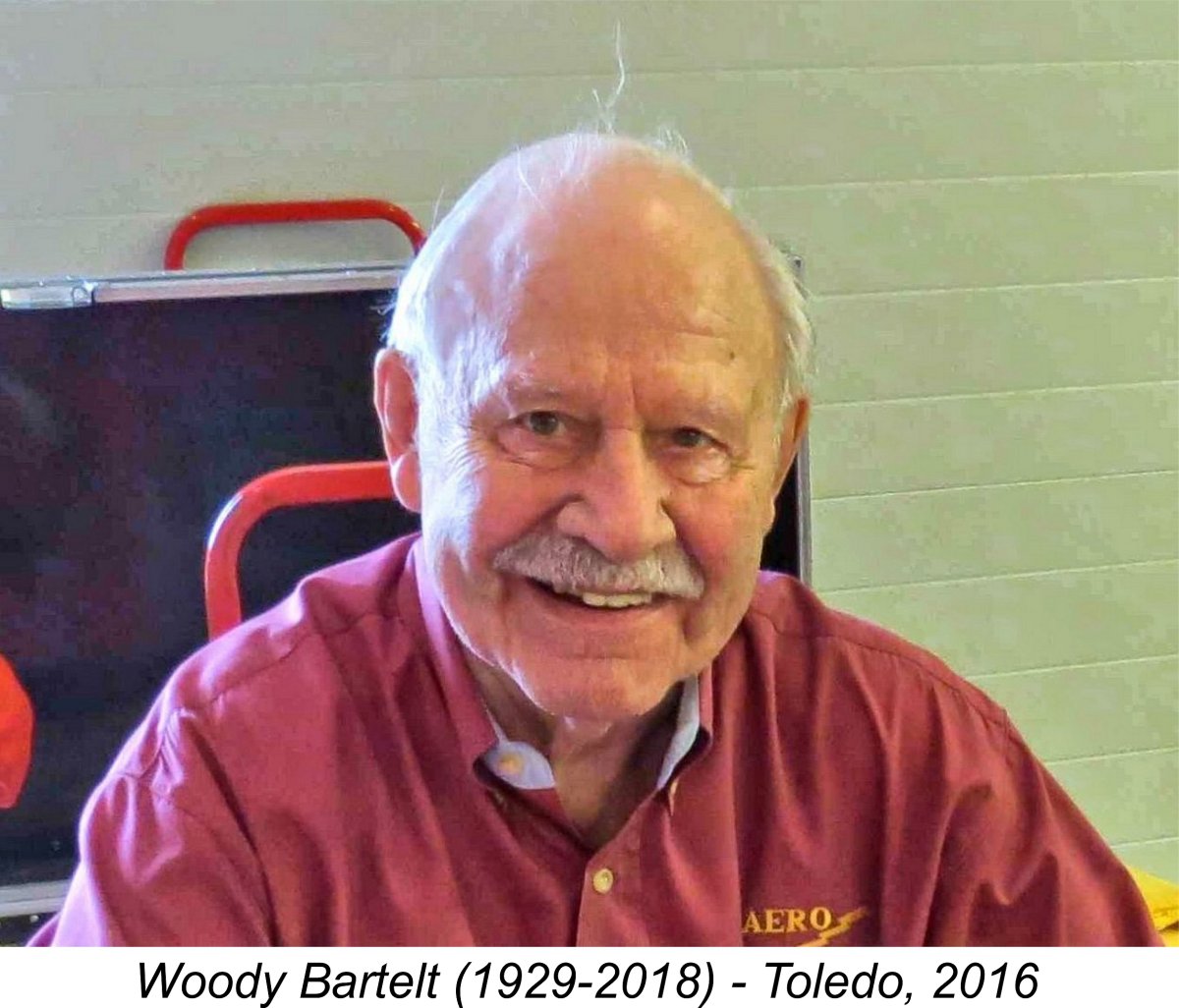 On a serious note, this past month saw the departure of yet another valued member of our worldwide community. This one strikes very close to home for me personally - the gentleman concerned was a valued supplier and colleague as well as a noted fellow enthusiast. I'm speaking of Woody Bartelt (1929-2018) who passed away on April 14th, 2018 at the age of 88 years.
On a serious note, this past month saw the departure of yet another valued member of our worldwide community. This one strikes very close to home for me personally - the gentleman concerned was a valued supplier and colleague as well as a noted fellow enthusiast. I'm speaking of Woody Bartelt (1929-2018) who passed away on April 14th, 2018 at the age of 88 years. 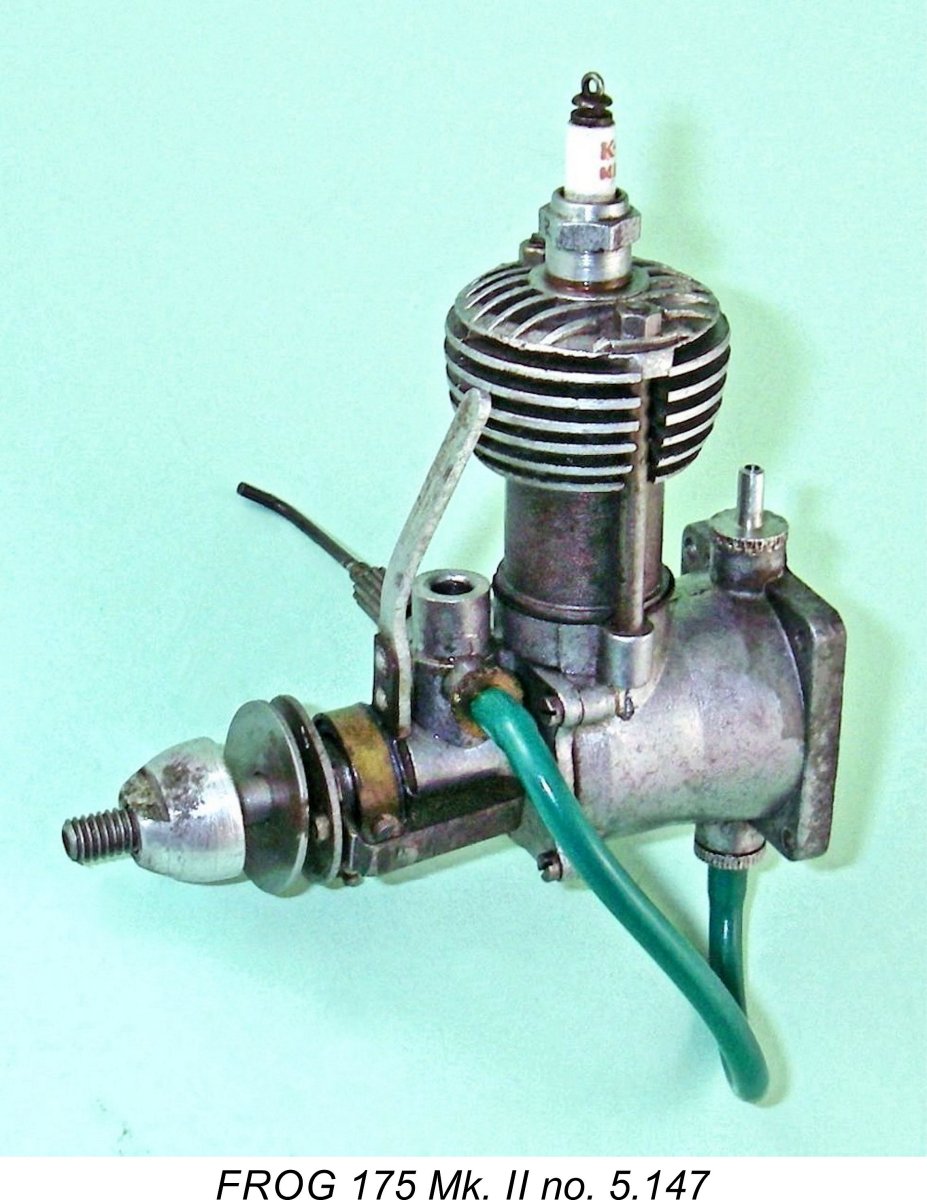
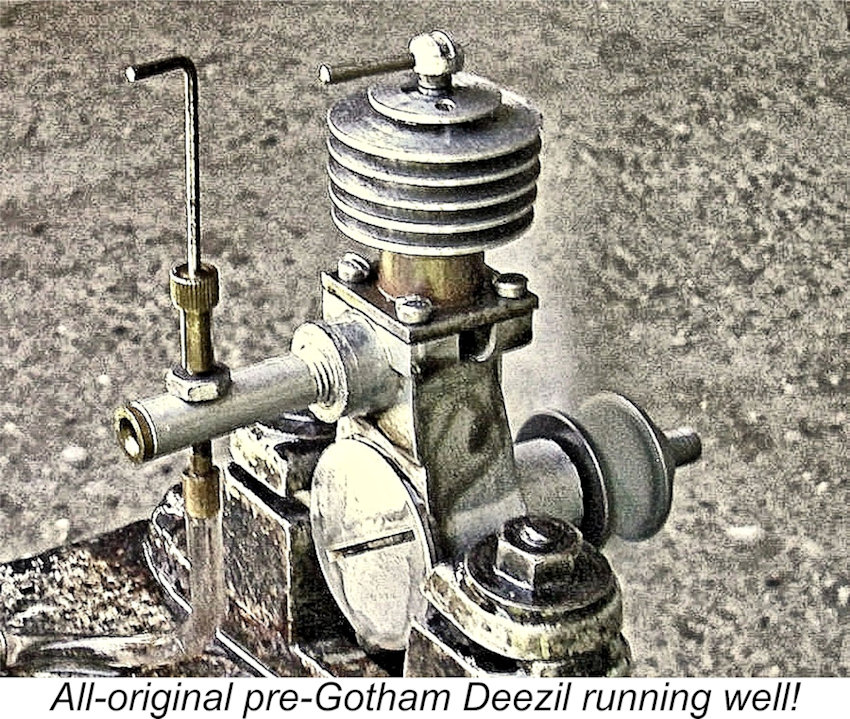
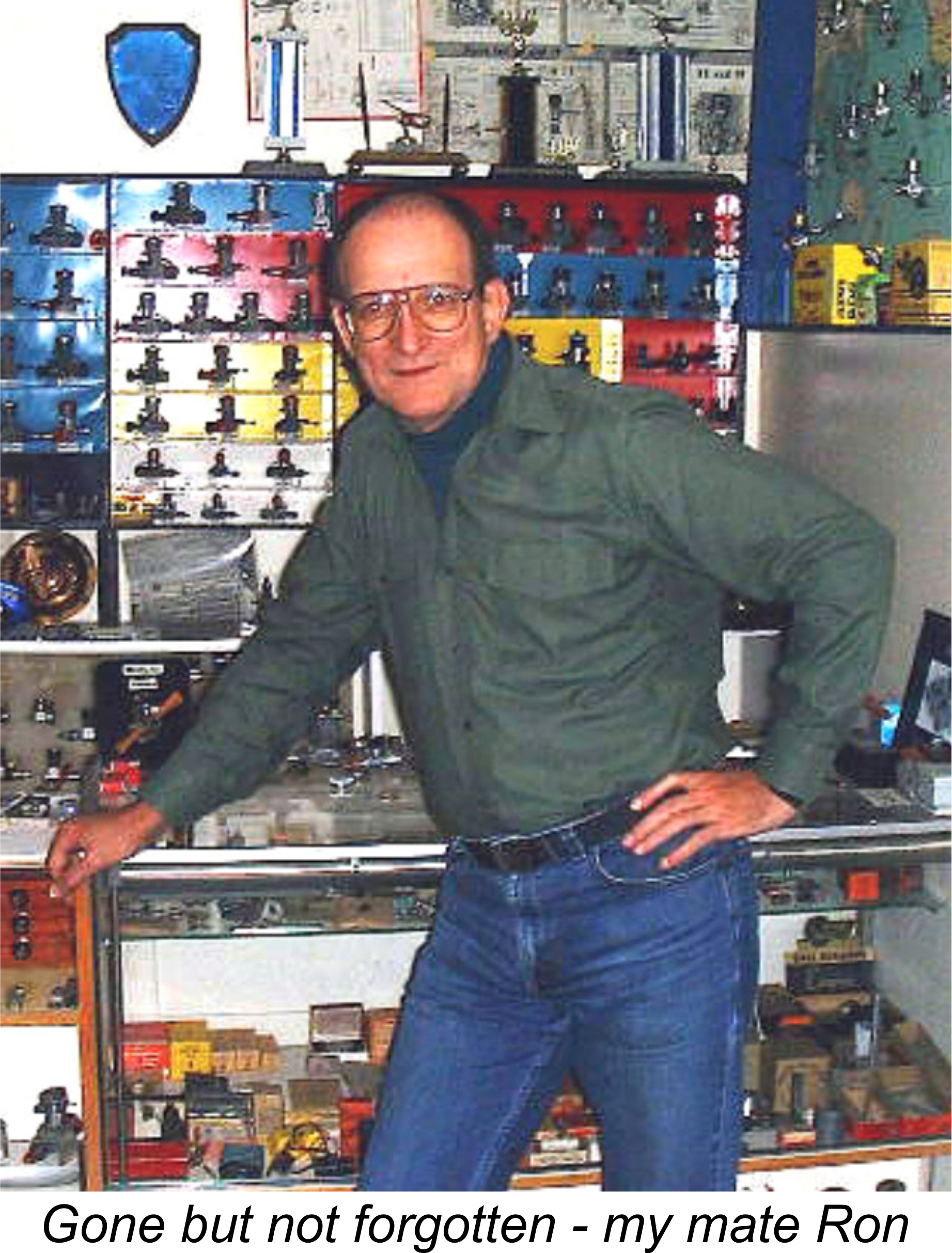 high-quality CAD plans for an impressive array of model engines for home construction. These were compiled into two distinct near-legendary collections - the Motor Boys International Plan Book, which was sold for a time by the AMA but has been unavailable for some years, and the MEN Members-Only Plan Book which was made available exclusively to financial subscribers to Ron's site. Both publications are much sought-after resources among today's home constructors of model engines - I've had many inquiries regarding their availability.
high-quality CAD plans for an impressive array of model engines for home construction. These were compiled into two distinct near-legendary collections - the Motor Boys International Plan Book, which was sold for a time by the AMA but has been unavailable for some years, and the MEN Members-Only Plan Book which was made available exclusively to financial subscribers to Ron's site. Both publications are much sought-after resources among today's home constructors of model engines - I've had many inquiries regarding their availability.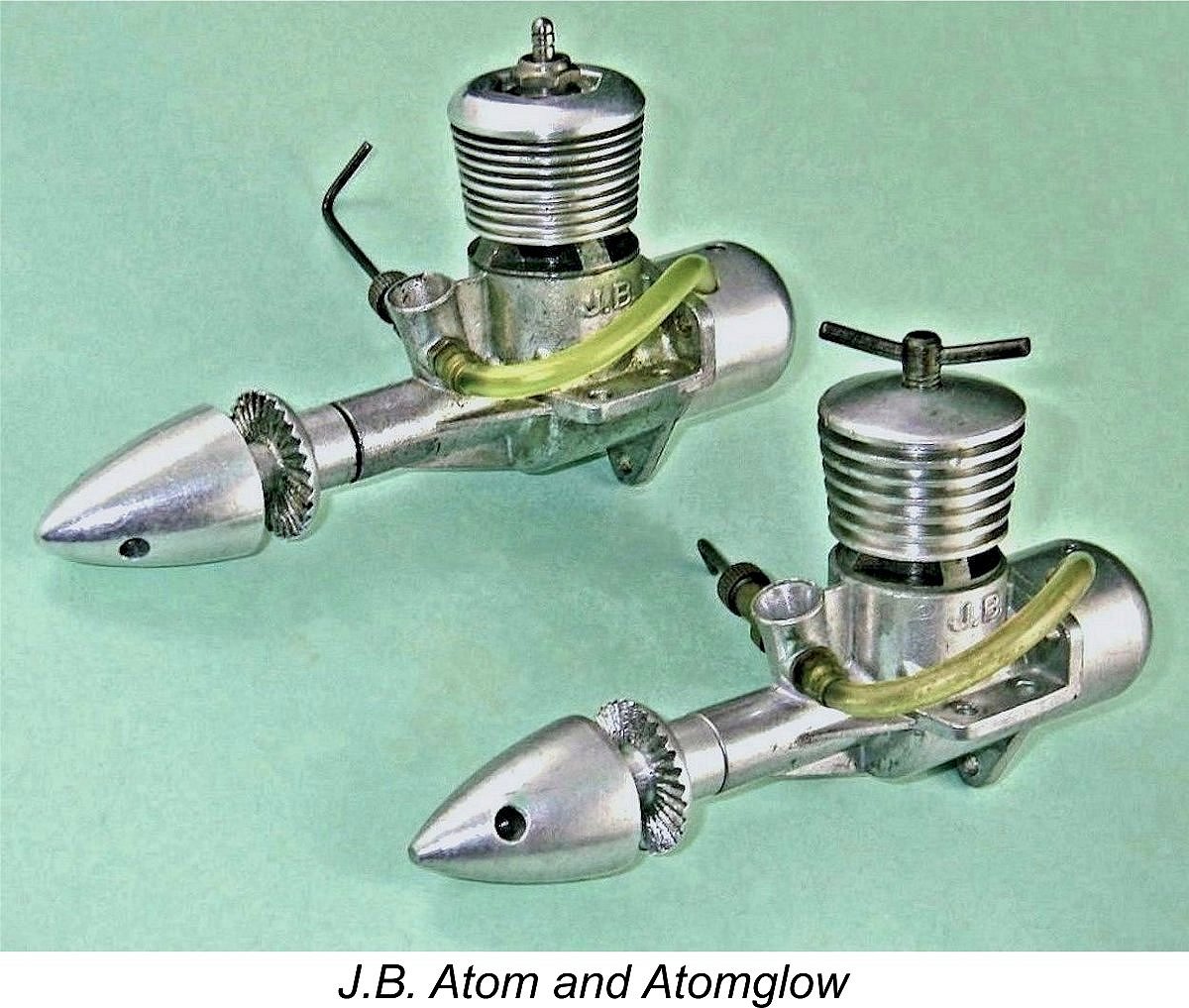
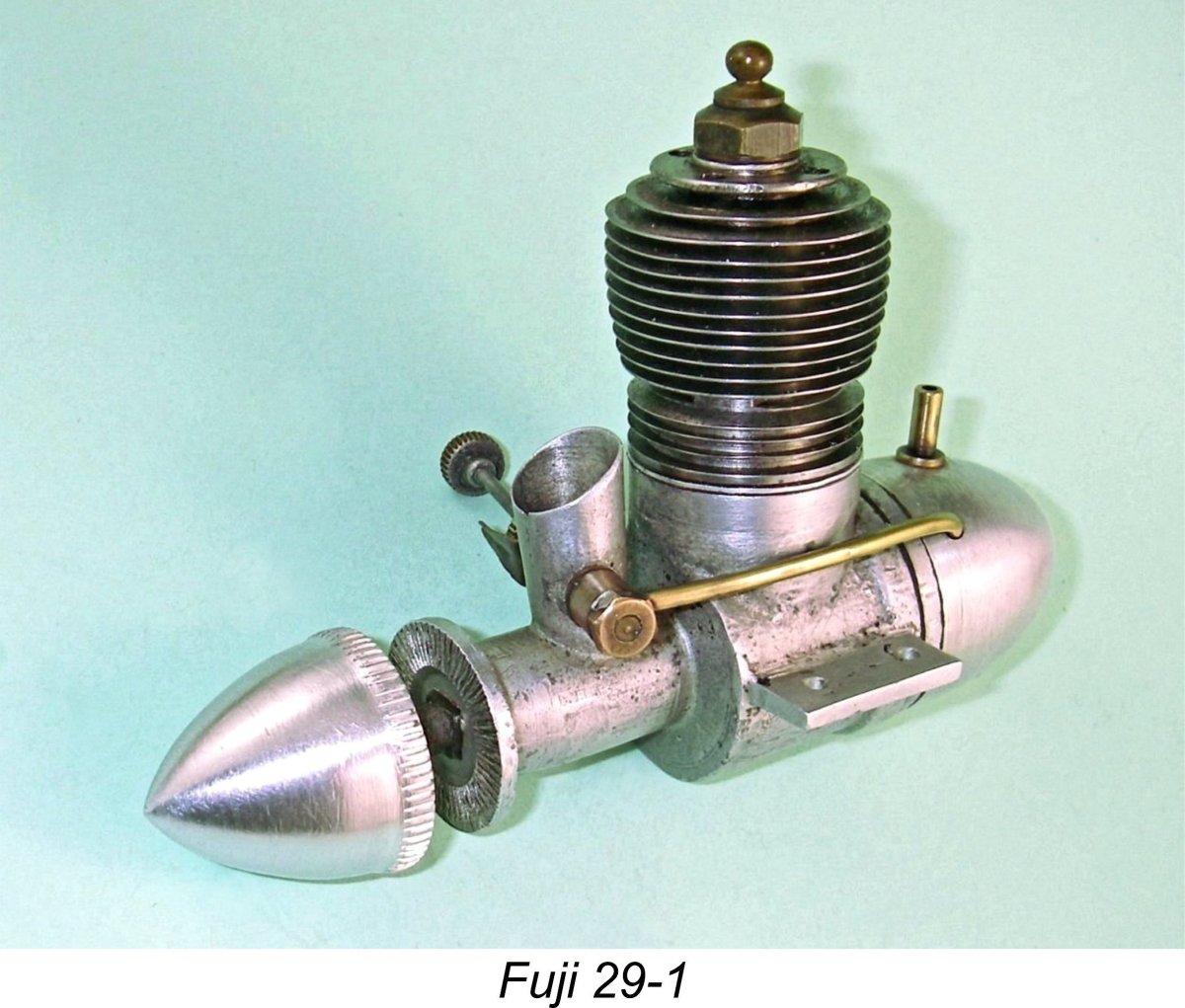 It's been a while since we last visited Japan, so for next month I plan to return to that country for a close-up look at the series of .29 cuin. and .35 cuin. models produced by the
It's been a while since we last visited Japan, so for next month I plan to return to that country for a close-up look at the series of .29 cuin. and .35 cuin. models produced by the